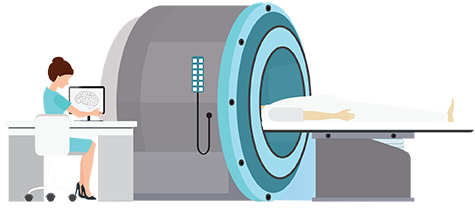

Professionals in the radiology field pursue formal educational programs with classroom and clinical training designed to prepare them to work safely with patients and complex equipment. In most states, radiologic technologists must complete an accredited training program, according to the Bureau of Labor Statistics.
Many professionals choose to pursue an Associate of Science degree in radiology. In fact, the BLS reports that the most common educational path for radiologic technicians and technologists is the radiology associate degree. However, not every radiologic technician or technologist majors in radiology. Some have completed an associate or bachelor’s degree in a different field that satisfies the didactic requirements of the American Registry of Radiologic Technologists, or AART. The AART may be a part of your professional preparation as its certification is required by many states for licensure of radiologic technicians.
Associate degrees in radiology allow students to focus specifically on classes in this field. Associate degrees typically require a high school diploma or GED. Aspiring professionals may opt for associate degree programs because as of January 1, 2015, the minimum AART requirement for those taking the certification exam is an associate degree or higher.
Certificate programs have varying prerequisites depending on the specialization, but programs come in two main varieties:
For the second category of certificates, applicants usually need to be employed as rad-techs, which in turn means they have completed an approved training program and earned certification in basic radiology skills. This second type of certificate, which the AART calls the post-primary pathway, can cover subjects such as:
Bachelor’s degree programs in radiology generally require an associate degree, not necessarily in radiology. There are some exceptions made to these rules. For example, a school may allow radiology professionals with several years of on-the-job experience to substitute it for certain educational prerequisites. If you are in doubt about your unique scenario, the best thing to do is to ask the school of your choosing about the radiology bachelor’s degree program and the program’s pre-reqs.
Master’s degrees in radiology typically require candidates to have a bachelor’s degree, and in some cases, professional experience.
Again, prerequisites can vary by program, so request information from the schools to get specifics about each option.
Yes, check out our list of schools offering online radiology degrees. Because the use of specialized equipment is a must in radiology education, programs typically require your attendance at a physical location, however online-hybrid programs do exist. Depending on the program, elements of the curriculum may be available through online studies. If you are already employed in radiology or health care, you may qualify for an online fast-track program. For practicing radiology professionals, the AART currently accepts online CE credits from approved continuing education courses.
Certificate programs or diplomas can help to prepare you for the ARRT exam, however, first you should check your state radiology license requirements to determine if you must be certified through the ARRT or hold a post-secondary degree. Additionally, as mentioned above, AART policy as of 2015 requires applicants sitting for the exam to have earned at least an associate degree prior to the test date.
It is also recommended that you look at some of the available radiology job listings in your area to gauge the qualification requirements. Find out if a radiology certificate can be sufficient education or if you need to pursue one of the radiology degrees to be competitive in your area. School representatives may also be able to give you some insight into local job markets.
Radiology certificates fall into two categories. The first category is for those entering the field, and the second is for those looking to expand their skills. Here is a list of the more common certificates you can find in radiology school programs:
Radiology certificate programs are designed to provide you with fundamental knowledge in radiologic sciences to enable you to seek entry-level positions. If you are already working in radiology, completing a certificate program in a radiology specialization may be the next step toward expanded duties or promotion; the BLS foresees promising job opportunities for technologists with multiple certifications (BLS.gov/ooh, 2013).
A bachelor’s degree in radiology can offer a robust educational experience, and the expanded course of studies allows for an emphasis in advanced radiology modalities and/or health care management. Individuals who would like to pursue leadership positions can explore bachelor’s degrees in radiology; for example, a program might offer a fast track to a master of health administration degree.
A bachelor’s degree in radiology takes approximately four years of full-time studies from start to finish, depending on the program and the student’s schedule. However, many students who pursue a bachelor’s radiology degree have already completed an associate degree or some formal training and have experience working in the field, so a program could take less time to complete.
An associate degree may be required before you can enter a radiology bachelor’s degree program. Each school has different requirements, so it is important to request information and discuss the requirements with a school representative.
The curriculum can vary widely, however, the following classes are found in many degree and certificate programs:
For more information on common course work, please visit our radiology courses page.